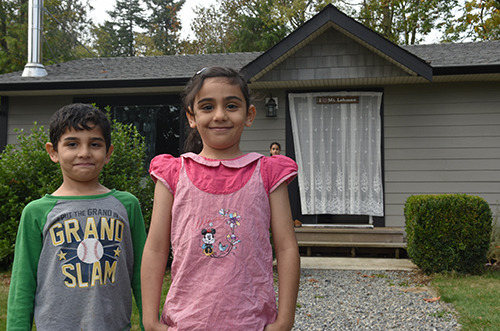
It was supposed to be an unpleasant three-hour trip on a dirty,
dilapidated boat. But 24 hours after leaving Syrian shores, the Alshayeb family
had run out of food and drinking water, and were still somewhere in the
Mediterranean sea, with no land in sight. Amer and Ibtihal, a married couple in
their late 20s, their infant daughter Zaneb and Amer's mother Najia would spend
another two full days on that boat, with fellow passengers sick and dying
around them. Ten years later, Amer sips strong Arabic coffee in a small house
on a quiet and green Mt. Lehman property as he recounts those torturous days.
Outside, chickens cluck about and the Alshayeb's four children race around on
bikes. This idyllic setting for raising a family is a vast change from the
daily bombings of a war zone, a boat ride from hell, and nearly a decade of
languishing in wait for the opportunity to start anew. • • • • • The Alshayebs
have been stateless people their entire lives. As the descendants of
Palestinians who fled to Iraq in 1948, they have never held recognized
passports. When militias sprung up in the years following the U.S. invasion of
Iraq, the family was in constant danger of arrest or worse, simply for being
outsiders. In 2006, Amer, Ibtihal, Najia and baby Zaneb crossed into Syria
using fake Iraqi passports. From there they hired illegal smugglers who
promised safe passage to Cyprus on a mere three-hour boat ride. Soon after
landing on a dark and empty Cyprus beach, Amer was separated from his family.
He was arrested the next day. Three days later, he went before a judge who
wanted to deport him back to Syria, a country where he had no roots and knew no
one. He pleaded his case, telling the judge he could not be separated from his
family. It would be another 10 days before he was released, in Cyprus. Amer
then went looking for his wife, mother and child. He hadn't seen them in two
weeks and had no idea where they were. With help from his sister, who has been
living in Cyprus for six months, Amer found them in a refugee camp. The family
secured an apartment and a monthly allowance from the government to get by.
Ibtihal, who it turned out had been pregnant during the harrowing journey, soon
gave birth to their second daughter, Asma. She was followed by another girl,
Noor Alhuda, and a boy, Talal, over the next four years, as the family tried to
establish some semblance of a normal life in...

Source: http://www.abbynews.com
